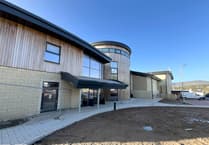A report outlining ways to decarbonise heating systems in the island’s homes and buildings has been published.
In an effort to help the island achieve net zero by 2050, the government has identified that around a quarter of greenhouse gases come from properties, so renewable options, like heat pumps, will play a key role in doing this.
There are around 43,000 homes in the Isle of Man currently.
The Renewable Heating Report, by London-based low carbon specialist consultancy Gemserv, establishes different scenarios for reducing emissions caused by heating buildings by close to 100% by 2050, one of which would achieve this earlier by 2040.
Each recognises that the installation of fossil fuel (oil and gas) systems will be gradually phased out from 2025, and compares the level of change needed along with associated costs.
It suggests that current heating methods can be replaced by more efficient low carbon systems.
These include air source heat pumps, direct electric, biofuels or district heating systems, where multiple buildings are heated from a central source.
The report also acknowledges the affordability and practicality of renewable heating options is a ’key issue to consider given the wide range of potential pathways’ and the need to develop one uniquely suited to the infrastructure, life and culture of the island.
Chair of the Climate Change Transformation Board Daphne Caine said: ’Making homes and buildings more energy efficient can reduce energy bills, improve lives, and create jobs.
’To ensure we reach net zero, we must decarbonise and this report shows the different ways we can do it, whilst highlighting areas for further exploration.
’We are in a good position as some of the technology suggested is gaining momentum, such as heat pumps, which have been used in Scandinavian countries for decades.
’These systems are significantly cheaper to operate as they capture energy from the air or ground, with just a small amount of electricity used to pump the heat round the property.
’The growing popularity means the initial installation cost is expected to fall over the next few years making this huge transition more affordable.’
Meanwhile, a consultation is currently seeking public views on the Isle of Man’s interim greenhouse gas reduction target that once agreed must be achieved by 2030.
The consultation outlines two options that focus on the high emission sectors of energy, heating, transport and land use/food production.
It closes on February 21.
The government’s climate change team will now work to develop a strategy which takes account of the scenarios and best suits the island’s needs and net zero goal.
The public can find out more about the renewable heating scenarios at a public event, hosted by Net Zero Isle of Man.
It takes place today (Thursday) at 5:30pm and is about transitioning to carbon neutrality.
The talk is being held at Noa Bakehouse in Douglas.




